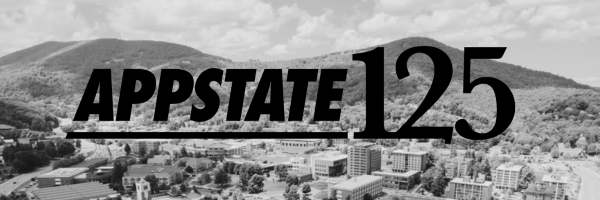During the late 19th century, an expanding public education movement in the United States led to the founding of Watauga Academy (1899-1903), which was created to train teachers for rural mountain areas. The school fostered a sense of pride for the Watauga area, and the connection with the community helped the school advance. When the school became Appalachian Training School (1903-1925), a state institution, Watauga community members donated funds and supplies to build the new building. The school continued to share progress with the community. Farmland was purchased, and the New River Light and Power Company provided electricity to the campus and six community members.
The school navigated the societal and educational impacts of WWI and the Spanish Influenza quarantine. There was a shortage of teachers following the war, and the North Carolina General Assembly encouraged the school to train elementary school teachers. The school met this directive by becoming Appalachian State Teachers College (1925-1967). More challenges were faced with the onset of the Great Depression, a period of economic hardship, and the school was able to keep food costs down by sourcing food from its farms.
Once kept in strict order under in loco parentis, where the university would act in place of a parent, the students began to assert their own agency. This transformation was not immediate but a gradual process. Women and men students separated even during school sporting events, started to challenge these norms. They organized a strike in 1935 and imposed class boycotts to effect change. The Student Council played a pivotal role in the continuous change over the years by advocating for the rights of the students. Over time, women were granted additional rights, with curfew, dating, and clothing restrictions lessening.
When World War II began in 1941, the school connected with the community to join the war effort. Food rationing and the purchase of war bonds were encouraged by the White House. Some students were drafted into the armed service, while others wrote to loved ones overseas. The Home Economics department aided in food and monetary ration education by hosting community events. When the war was over, men returned home, and enrollment increased.
Strict rules of dress and disciplinary practices were loosened during the 1950s. In the 1960s, the student body slowly became more diverse as Civil Rights trailblazers paved the way for future generations. On July 1, 1967, the institution grew to become Appalachian State University (1967-present) and became a part of UNC's system in 1971. In 1972, Watauga College opened, a small learning community with an interdisciplinary studies-oriented curriculum. The Student Government Association and the Student Bill of Rights were formed through the advocacy of students concerned over administrative control of their voice and narrative. Diverse student organizations were created, and free speech was continuously addressed. Student groups protested the Vietnam War and the draft. Title IX of the Civil Rights Law prohibited sex-based discrimination in federally funded educational institutions. Special interest groups were formed on campus, including the Organization on the Status of Women, which was formed by faculty. Subsequently, the Women's Resource Center was established. African-American students were increasingly voted into positions of power, and students pushed for environmental awareness. A Women's Studies minor was implemented, and the official status of the Gay Awareness Organization was granted.
During the 1980s, students continued to use their voices to enact changes on campus. However, not all sought-after changes were made, as evidenced by the 1986 student demand that the university refrain from purchasing South African goods.
Gender studies were added to the curriculum, and the Sustainable Development Program was established, continuing community-engaged farming practices. The university received national attention for the success of the Mountaineer football team in 2007. Gender identity and expression were added to the campus Equal Employment Opportunity policy, and the LGBT Center opened in 2008. Diverse and inclusive student groups continue to be formed and enact the change they want to see.
This exhibit mirrors 125 Years in Retrospect: A Brief Survey of the History of Appalachian State University, which is available in the display cases on the fourth floor of Belk Library and Information Commons.
